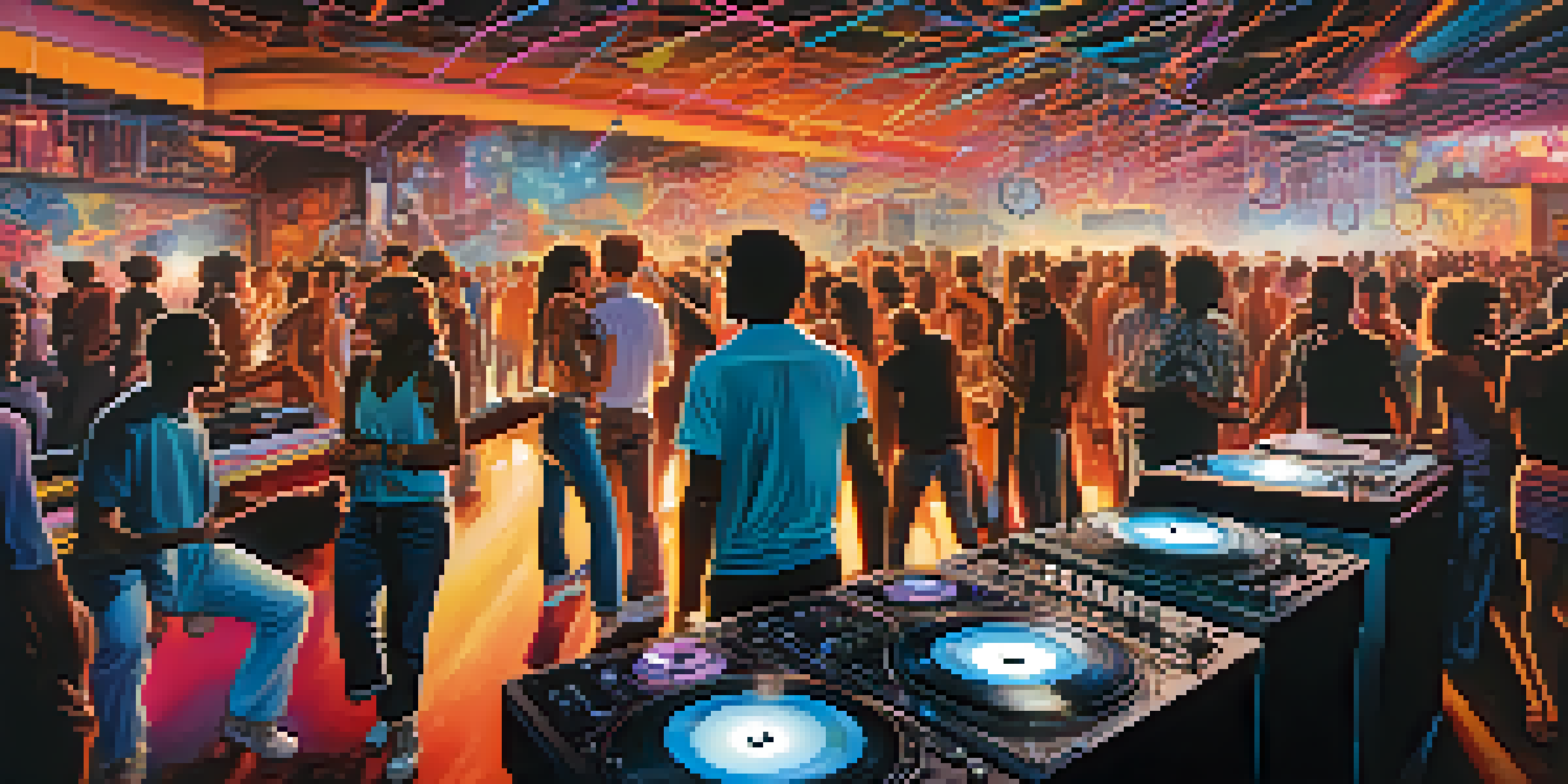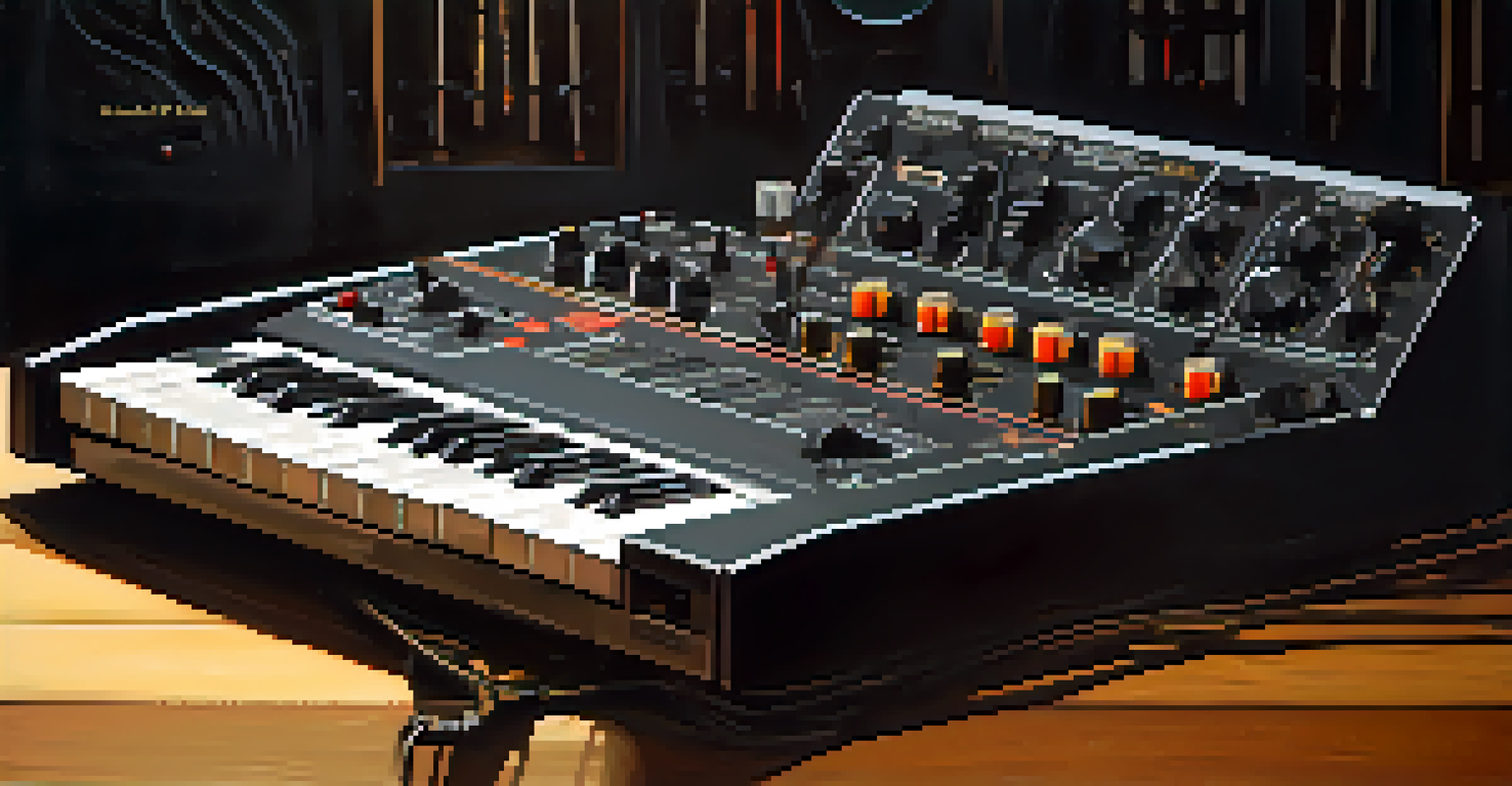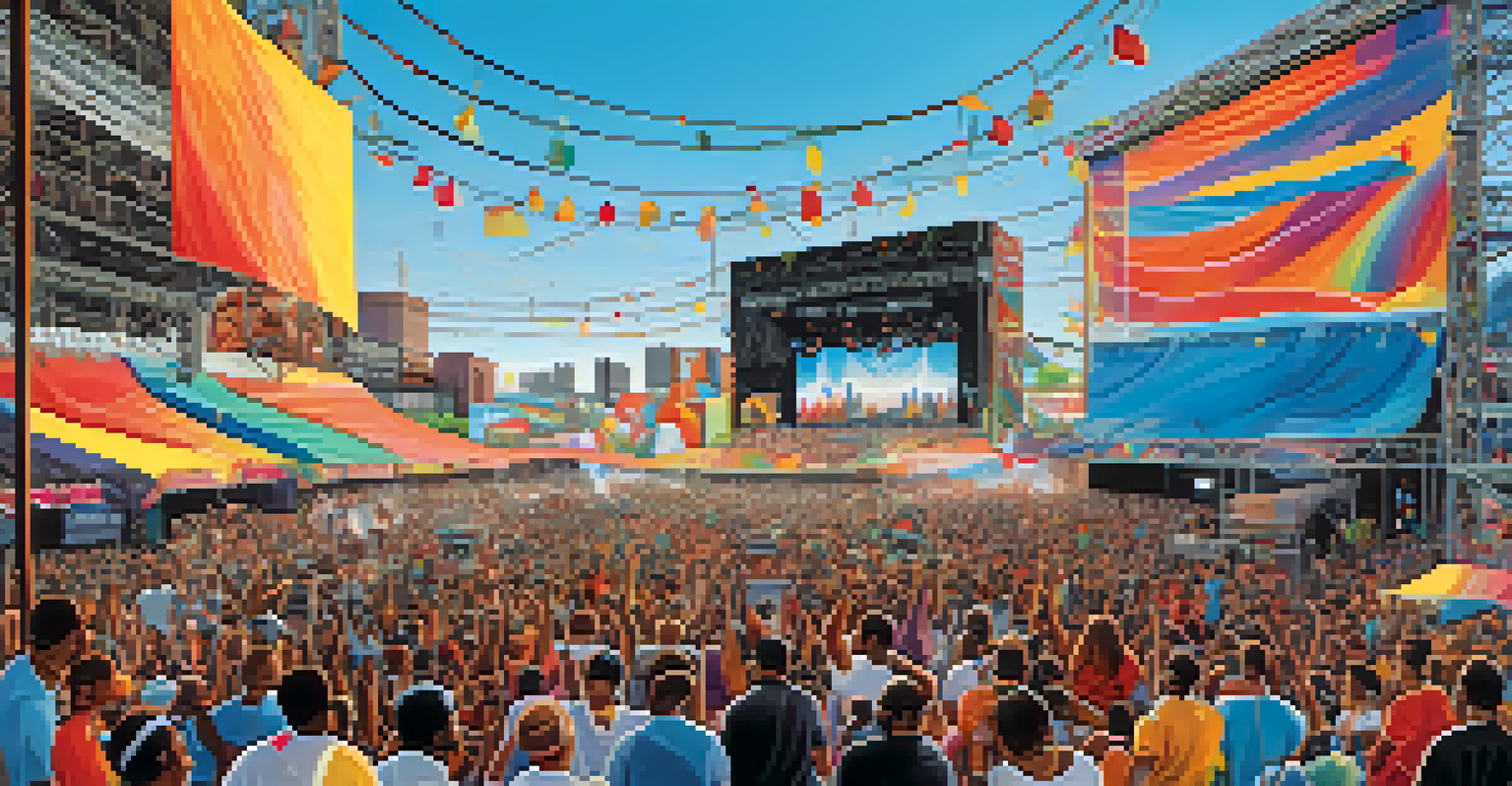The Rise of Detroit Techno: A Global Music Phenomenon

The Origins of Detroit Techno in the 1980s
Detroit techno emerged in the early 1980s, rooted in the city's rich musical history. Artists like Juan Atkins, Derrick May, and Kevin Saunderson, often referred to as the 'Belleville Three,' began experimenting with electronic sounds. Inspired by funk, disco, and the burgeoning electronic music scene, they created a new genre that combined rhythm with technology.
Techno is the sound of the future, a reflection of the times we live in and a powerful means of expression.
This innovative sound was a response to the social and economic challenges facing Detroit at the time. The city's decline in industry and rising unemployment led many young people to seek solace and expression in music. Using synthesizers and drum machines, these pioneers crafted tracks that reflected both their struggles and aspirations.
As local underground parties began to flourish, the Detroit techno scene gained momentum. Clubs like the Music Institute became hotspots for dance enthusiasts, where the beats of techno echoed late into the night, setting the stage for a movement that would soon reach far beyond the city limits.
Key Figures Who Shaped Detroit Techno
The influence of Detroit techno can be largely attributed to a handful of visionary artists. Juan Atkins, often dubbed the 'Godfather of Techno,' pioneered many of the genre's early sounds, while Derrick May introduced a more melodic approach with tracks like 'Strings of Life.' Kevin Saunderson, on the other hand, brought a house music flair, blending styles that appealed to a wider audience.

These artists didn't just create music; they built an entire culture around it. They organized raves, collaborated with other musicians, and developed labels to distribute their work. Their collective efforts laid down the foundational ethos of techno: a commitment to innovation and community.
Detroit Techno's Rich Origins
Detroit techno emerged in the 1980s as a response to the city's social and economic challenges, blending electronic sounds with the city's musical heritage.
The legacy of these figures continues to resonate today, not just in Detroit but around the globe. Their passion and creativity have inspired countless DJs and producers, ensuring that the spirit of Detroit techno lives on in contemporary electronic music.
The Role of Technology in Shaping the Sound
Technology has always been at the heart of Detroit techno. The use of synthesizers, drum machines, and sequencers allowed artists to create sounds that were previously unimaginable. Instruments like the Roland TR-808 and TB-303 became staples in the production of techno music, enabling a unique blend of beats and melodies.
Detroit techno is not just music; it’s a way of life, a community of innovators and dreamers.
This technological innovation not only shaped the sound but also influenced how music was created and consumed. As artists began to experiment with different sounds and production techniques, they pushed the boundaries of what techno could be. This experimentation gave birth to subgenres like minimal techno and acid house, expanding the genre's reach.
Moreover, the accessibility of music production software in recent years has democratized the creation of electronic music. Today, aspiring producers can create tracks from their bedrooms, perpetuating the cycle of innovation that defines the genre. Detroit techno's spirit of creativity continues to thrive as new generations explore the possibilities of sound.
The Global Spread of Detroit Techno
From its humble beginnings in Detroit, techno has transcended borders to become a global phenomenon. The 1990s saw a surge in interest, with European cities like Berlin, London, and Amsterdam embracing the sound. Clubs and festivals began featuring Detroit techno artists, showcasing the genre to an international audience.
This global spread was aided by the rise of the internet and digital music platforms. Fans could easily access tracks and mixes, sharing their love for Detroit techno across social media. As a result, the genre began to influence various musical styles worldwide, from pop to hip-hop.
Cultural Impact and Community
The genre has become a cultural movement, providing a voice for marginalized communities and inspiring creativity across various art forms.
Today, techno festivals like Movement in Detroit and Awakenings in the Netherlands draw thousands of fans from all corners of the globe. This international embrace of Detroit techno not only celebrates its origins but also highlights its adaptability and enduring appeal in the ever-evolving music landscape.
The Cultural Impact of Detroit Techno
Detroit techno is more than just music; it's a cultural movement that reflects the city's identity. The genre has provided an outlet for expression, particularly for marginalized communities in Detroit. Through its beats and rhythms, techno has become a voice for those seeking connection and unity amidst adversity.
This cultural significance has been recognized in various art forms, including visual art, fashion, and film. Artists have incorporated techno's aesthetic into their work, creating a vibrant tapestry that celebrates Detroit's rich heritage. Documentaries and exhibitions have also highlighted the genre's impact, ensuring that its story is told and remembered.
Moreover, the ethos of techno—community, innovation, and resilience—continues to inspire new generations of artists and fans. As the genre evolves, it remains deeply rooted in its cultural origins, fostering a sense of belonging and identity for many.
The Future of Detroit Techno
As Detroit techno continues to evolve, its future looks bright. New artists are emerging, bringing fresh perspectives and sounds to the genre. This new wave of creativity is not only rooted in the traditional elements of techno but also incorporates influences from various musical styles, creating a rich tapestry of sound.
Additionally, the resurgence of interest in vinyl records and analog equipment has sparked a renewed appreciation for the genre's origins. Many producers are returning to the roots of techno, experimenting with vintage gear to capture the authentic sound of early Detroit tracks. This blend of old and new ensures that the spirit of Detroit techno remains alive and well.
Global Reach and Evolution
From its local roots, Detroit techno has gained international acclaim, influencing diverse musical styles while continuing to evolve with new artists and technology.
As the genre grows, it faces challenges, including commercialization and the risk of losing its underground essence. However, the community's dedication to innovation and authenticity will likely guide Detroit techno into the future, ensuring it remains a vital part of the global music landscape.
Celebrating the Legacy of Detroit Techno Today
Today, the legacy of Detroit techno is celebrated through various events, festivals, and initiatives. Movement Festival, held annually in Detroit, brings together techno enthusiasts from around the world to honor the genre's roots. This celebration not only showcases classic tracks but also highlights new talent, bridging the gap between generations.
Moreover, educational programs and workshops are being established to teach young artists about the history and techniques of techno music. These initiatives foster a sense of community while ensuring that the genre's rich heritage is passed down to future generations. Engaging the youth is essential for keeping the spirit of Detroit techno alive.

Ultimately, the legacy of Detroit techno is one of resilience, creativity, and community. Its journey from the streets of Detroit to global stages continues to inspire and connect people through the universal language of music, proving that the beats of techno will echo for years to come.